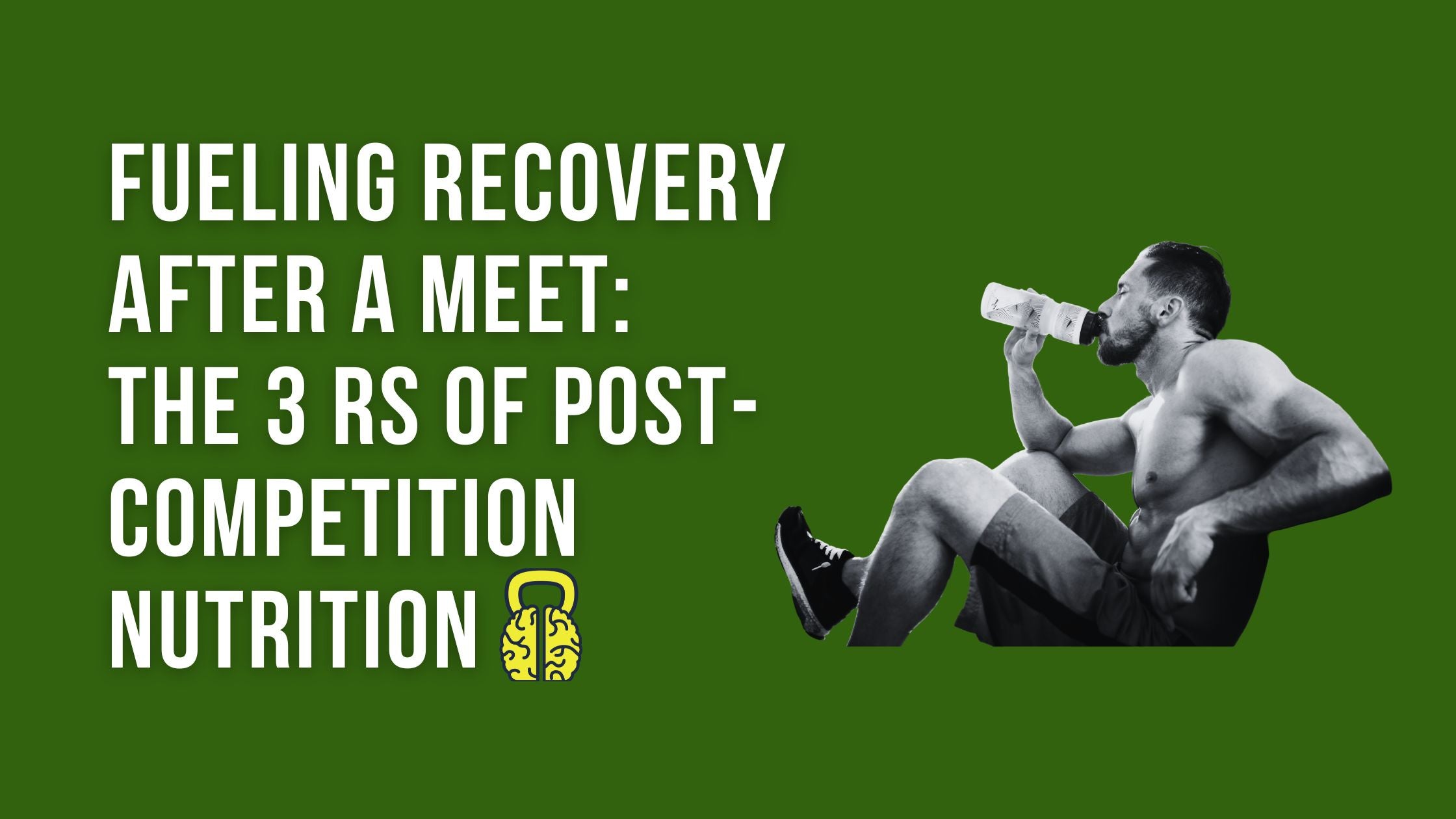You did it. The bar was loaded, the lights were on, and you put months of training, discipline, and probably a stressful weight cut on the line. You gave it everything.
Now the meet is over, and the adrenaline is fading. The next step—which is arguably just as critical as your training block—is recovery.
Many athletes view the day after a competition as a "cheat day" free-for-all or, conversely, immediately crash into a severe diet. Both approaches compromise the hard-won gains you just secured.
Your post competition nutrition isn't just about feeling better; it’s about setting the stage for your next PR. What you do this week determines the success of your next cycle.
Why Post-Competition Nutrition Matters
A competition, whether it’s a powerlifting meet, a CrossFit test, or an intensive training peak, places immense stress on the body and mind.
Physiologically, you are dealing with:
- Massive Glycogen Depletion: Your primary fuel source for strength work is largely emptied.
- Systemic Inflammation: Microtrauma to muscle fibers creates high levels of inflammation and soreness.
- Nervous System Fatigue: The emotional and psychological energy of the day, combined with possible water or weight cuts, leaves your central nervous system drained.
Ignoring these factors can lead to prolonged soreness, plateaus, and increased risk of injury. Strategic sports nutrition recovery addresses these issues immediately, speeding up muscle repair and ensuring you can return to effective training sooner.
The 3 Rs of Post-Competition Nutrition
Forget the endless science debates. For simple, effective recovery, we focus on three immediate goals: Rebuild, Rehydrate, and Refocus.
1. Rebuild (Protein)
Your muscles have just endured a war. Protein is the repair crew. Immediate intake starts the process, and consistent intake throughout the first few recovery days ensures your muscles have the raw materials they need.
- The Goal: Repair damaged muscle fibers and stop catabolism.
- The Strategy: Aim for 0.7–1.0 grams of protein per pound of body weight across your daily meals. For a 200 lb athlete, that means 140–200 grams of protein.
- Actionable Tip: Don't skip breakfast the day after a meet. Have a quality protein source (eggs, yogurt, or a shake) within 1–2 hours of waking to maintain muscle protein synthesis.
2. Rehydrate (Fluids & Electrolytes)
Especially if you had a weight cut or competed in a hot environment, you are likely depleted of both water and key electrolytes (sodium, potassium, magnesium).
- The Goal: Restore fluid balance and neurological function.
- The Strategy: Drink water constantly. A good baseline is half your bodyweight in ounces of water minimum (a 200 lb athlete needs 100 oz). Add electrolyte tabs or a recovery drink to every third glass of water.
- Actionable Tip: Salty whole foods (like broth, a handful of salted nuts, or even some pickles) are excellent sources of sodium and help you retain fluids better than water alone.
3. Refocus (Carbohydrates)
Many lifters go straight to "junk food" after a meet. While a celebratory meal is fine, don't let a full day of indulgence derail your progress. The priority is adding back strategic carbohydrates to replenish glycogen after a workout.
- The Goal: Refill muscle energy stores for the next training cycle.
- The Strategy: The first 24–48 hours post-meet is the most crucial window for glycogen uptake. Prioritize easily digestible carbs like rice, oats, pasta, and fruits.
- Actionable Tip: Continue to consume an extra carb serving at each meal for 3–5 days post-meet, especially if you have an appetite for it. Focus on quality—don’t fast or skip meals!
Strategic Nutrition for Strength and Weight Loss Goals
The post-meet recovery week is a critical transition, whether you are trying to gain strength or pivot toward a weight loss for athletes phase.
If Your Goal is Strength/Performance:
Maintain a slight calorie surplus using the high-quality protein and carbs mentioned above. Cutting calories too soon when your body is inflamed and glycogen-depleted can halt recovery and undermine adaptation. The immediate recovery week is not the time to start a cutting phase.
If Your Goal is Weight Loss:
You can strategically begin a cutting phase after 7 days of quality recovery. Resume or slightly decrease your caloric target/macros only after inflammation has subsided, and your training load has stabilized.
Macro tracking after a meet should focus on high protein intake first. If your training tapers this week, you can slightly lower fats/carbs to maintenance levels, but never drastically cut them.
“After a meet, my nutrition priority is quality protein and hydration. I worry about the macros only once the soreness is gone and I’m ready to hit the next training block.” — Coach Jess @ The Strength Agenda
Takeaway: Recovery Is Training
Your effort in the gym is only half the equation. Fueling recovery after a meet is where the magic of adaptation happens. By following the 3 Rs—Rebuild, Rehydrate, and Refocus—you turn a stressful event into a springboard for your next peak performance.
If you want a recovery week meal plan tailored precisely to your body, goals, and upcoming training block, guessing is not an option.
📲 Bonus: Get Expert Help with Online Nutrition Coaching
Ready to stop guessing about your macros and start using performance strength athlete nutrition strategies that guarantee long-term results? Our coaches specialize in post-competition recovery and making weight loss work without compromising your strength.



